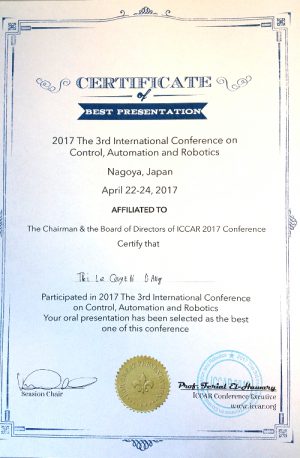We present a robot emotion representation model by investigating the role of human-inspired social effects and memory retrieval process. Social referencing and social sharing are modeled as human guides to share knowledge and direct or influence robot emotion generation. The robot’s acquired knowledge is consolidated into a developmental memory architecture and used for future retrieval. This model enables robots interacting with their environment to learn from humans and form a human-like emotion generation process which helps to facilitate personalized human-robot interaction.
Thi Le Quyen Dang, Sungmoon Jeong, Nak Young Chong, “Personalized Robot Emotion Representation through Retrieval of Memories,” Proc. International Conference on Control, Automation, and Robotics, pp. 65-70, Nagoya, Japan, April 22-24, 2017.
Best Presentation Award
